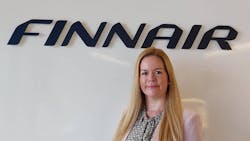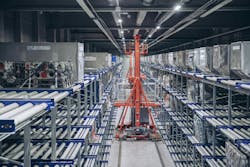Finnair Cargo's Strategy for Sustainable Success
Finnair Cargo enjoys a unique position in the global air cargo market, thanks in part to its dedication to cold chain logistics and a forward-thinking approach to sustainability and employee welfare.
Ground Support Worldwide sat down with Anna-Maria Kirchner, Head of Global Sales at Finnair Cargo, at the CNS Partnership Conference held in Miami in May, where she offered a look into the airline's operations, strategic pivots, and its commitment to specialized cargo. The following is an excerpt from that discussion.
GSW: What's the latest news from Finnair Cargo?
Kirchner: From last year to this year, we’ve effectively doubled our capacity into the US market. This means we now operate up to 11 flights per week to Dallas, five times a week to Los Angeles, five times a week to Seattle, and daily services to Chicago and New York, JFK. The strategic rationale is straightforward: we see an opportunity to capture a larger share of the market, particularly given our unique geographical position and operational strengths.
GSW: How much of a factor is Finland's geographical location to Finnair Cargo's opportunities and challenges?
Kirchner: Historically, Finland offered the shortest route from Europe to Asia by flying over Russia. However, the pandemic hit first, followed by the closure of Russian airspace. This presented a double crisis for us. Being only 200 kilometers from St. Petersburg and sharing a 1,300-kilometer border with Russia, this closure significantly impacted our direct routes.
Despite not being the largest carrier globally - we operate around 80 aircraft - we consider ourselves a niche carrier that's incredibly fast and agile in adapting our strategy. We've continued to fly to Asia by either taking a southern route or, more uniquely, a North Pole route back, flying over Alaska. This requires significant operational adaptation based on demand and geopolitical realities. While other Western and European carriers face similar challenges, our proximity to Russia means the extended flight times affect us more acutely.
GSW: What defines Finnair's niche in the air cargo market?
Kirchner: Our niche is specialized cargo, particularly in the cool chain. We are one of the largest transporters of salmon, shipping over 100,000 kilos of seafood daily, primarily from northern Norway, trucked down to Helsinki, and then flown to Asia and the US. Our entire operation is built around maintaining the cool chain. Our state-of-the-art cool terminal, opened in 2018, combines automation with human expertise and latest technology.
Our focus is on being a premium carrier. We don't aim to be the cheapest; instead, we prioritize quality and reliability. Our customers consistently acknowledge us as a premium product, trusting us to handle their shipments, especially sensitive cargo like pharmaceuticals, with the utmost care. This commitment to quality and specialization truly defines our niche.
GSW: Maintaining a successful cool chain operation involves significant technological and logistical integration. What do you see as the recipe for achieving this effectively?
Kirchner: A majority of our success stems from our technology supported hub and handling team in Helsinki. The technology within our COOL terminal is cutting-edge. However, the location of Helsinki itself plays a crucial role; it's a non-congested hub. Unlike mega-hubs in Europe such as Amsterdam or Frankfurt, which can experience bottlenecks for smaller shipments, our automation and lower congestion ensure smoother, more efficient handling, regardless of shipment size.
GSW: How do Finnish societal values and government policies inform Finnair's philosophy, particularly regarding employee welfare and operational efficiency?
Kirchner: Our government has a 55.8% ownership stake in the company, and this influence is evident in how we operate. We prioritize work-life balance for our employees; for instance, performance reviews begin by asking about work-life balance. Our regular working week is approximately 37 hours and we encourage rest to maintain energy.
A key Finnish trait reflected at Finnair is decentralized decision-making. We empower employees at various levels to make decisions, which allows us to react quickly to business opportunities. This "one voice" approach means everyone is accountable for their decisions, fostering a sense of ownership and agility.
Our longevity as one of the oldest carriers, established in 1923, is also a testament to this resilient and forward-thinking spirit. We've navigated challenges like the pandemic and airspace closure by constantly adapting and innovating. This cultural foundation contributes significantly to our positive and productive work environment.
GSW: Finnair appears to be very progressive in terms of gender equality and employee support. How do these principles manifest within the company, especially concerning family leave and career development?
Kirchner: It stems from a long-standing cultural ethos in Finland, where equal opportunity is a fundamental principle. For example, Finnish law allows for up to three years of maternity leave with job security, and free daycare facilities are strategically located near homes or workplaces to ease the transition back to work for mothers.
Crucially, this isn't just about women; it's about equal opportunity for all. We have male colleagues who take extended paternity leave, demonstrating a truly egalitarian approach. Our internal job rotation program is another example. We encourage employees to experience different departments, like moving from operations to revenue management or sales. This provides a 360-degree view of the business, fostering a deeper understanding and better collaboration, which ultimately benefits our cargo operations.
GSW: As an employer, how significant is Finnair within Finland, and what contributes to the strong loyalty among its employees?
Kirchner: Finnair is a very large employer in Finland, with around 6,000 employees. While this might not seem huge by American standards, for a country of 5.5 million people, it's substantial. We are consistently ranked among the top five most favorite employers in Finland, reflecting a strong brand and deep employee pride.
Employee loyalty is remarkable. I have colleagues who have been with the company for 20+ years. Many have received lucrative offers from other carriers, including those in the Middle East, but they choose to stay. This loyalty is attributed to a strong "Finnair DNA" - a positive, supportive, and empowering work environment that makes people feel valued and connected to the company's mission.
Q: How does Finnair balance technology and human expertise to maintain its premium service, especially with the increasing adoption of AI in the industry?
Kirchner: It's a balance of both. While we leverage technology extensively, including AI-supported forecasting for staffing and resource allocation, the cornerstone is our modern terminal that combines automation with the know-how of our cargo experts. The technology is only as good as the people operating it, which makes our human expertise critical.
We actively promote internal rotation among our cargo teams. For instance, someone from operations might spend a year in revenue management or sales. This cross-functional experience gives our team members a holistic understanding of the entire cargo
ecosystem, enabling them to connect the dots and anticipate needs more effectively. This unique approach, while less common in other companies, is something we actively encourage, fostering a highly knowledgeable and adaptable workforce that complements our technological capabilities.
GSW: Sustainability is a critical focus for the aviation industry. What initiatives is Finnair undertaking in this area, particularly within its cargo operations?
Kirchner: Sustainability is a significant priority, and Finnair is committed to advancing sustainable development in the industry. We have a dedicated sustainability manager for cargo and we work on various initiatives:
Waste Reduction: We are investigating processes to repair and re-audit cargo straps and nets used for cargo handling, preventing them from being discarded prematurely. While not cheaper, it significantly reduces waste.
Renewable Energy: Our COOL terminal in Helsinki is equipped with 2,990 solar panels, making it the second-largest solar panel field in Finland. These panels supply 37% of our electricity needs.
Sustainable Aviation Fuel (SAF): In Europe, a 2% SAF mandate is in place, meaning we're obligated to use this blend. We're actively partnering with fuel suppliers like Neste (headquartered in Finland) and freight forwarders, such as our recent important deal with DB Schenker, where they voluntarily purchased SAF with us. This helps both us and our partners meet their emission reduction targets (Scope 3).
We view sustainability not as a distant goal but as an urgent reality. We're actively collaborating with other airlines and forwarders to achieve the industry goal of carbon neutrality by 2050, emphasizing education and collective action.
GSW: Looking ahead, what do you envision for the future of Finnair Cargo, in terms of opportunities and overarching goals for the organization?
Kirchner: We anticipate organic growth for Finnair. We are still integrating additional A350 aircraft, which are excellent for cargo and contribute to our sustainability goals. Our immediate focus is on fine-tuning our current flight network. The geopolitical situation remains a key factor that will shape future developments.
The air cargo industry is inherently dynamic - when it goes up, it goes up significantly, and when it goes down, it goes down significantly; there's rarely a "normal." This dynamism makes it incredibly interesting. At Finnair, our smaller, agile organization allows us to react quickly to market changes and seize opportunities. We are confident in our ability to adapt and continue our positive organic growth, making it an exciting time to be in this industry with Finnair.


